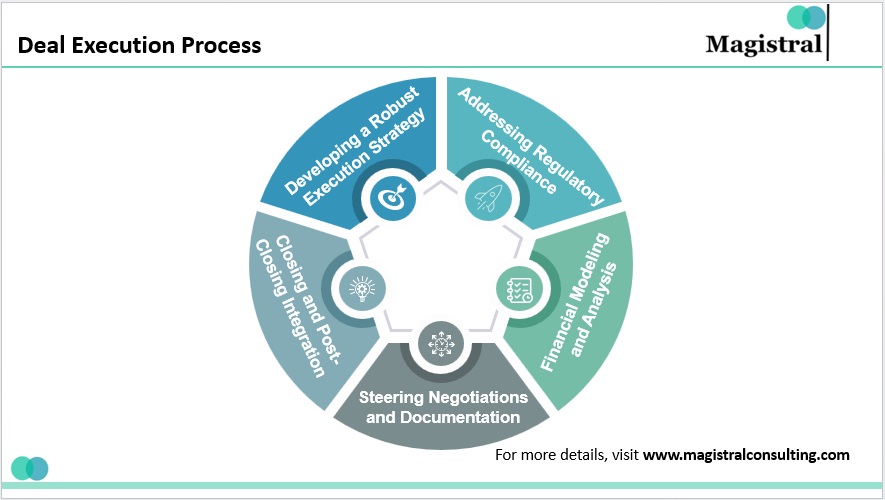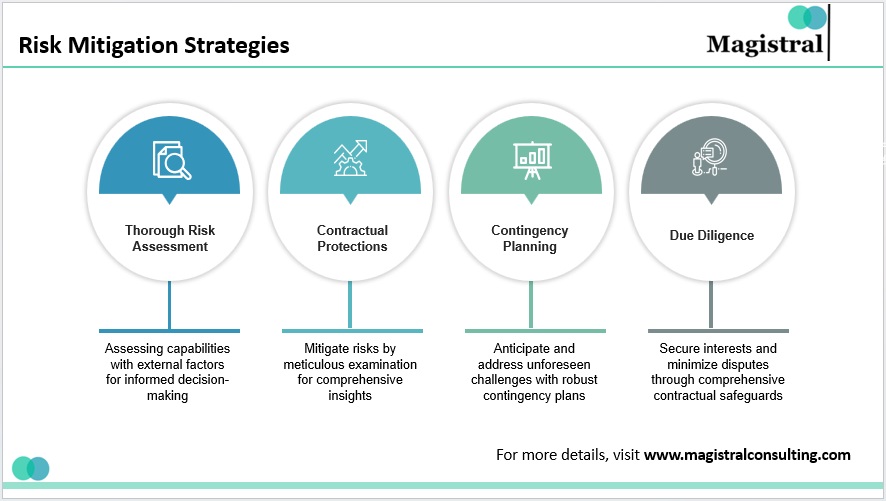Introduction
In the fast-paced world of business, navigating deals represents a crucial juncture where strategies materialize, decisions solidify, and outcomes are determined. Whether it encompasses mergers, acquisitions, investments, or other transactions, the execution of deals necessitates meticulous planning, extensive research, strategic decision-making, and adept financial modeling. In this detailed exploration, we delve into the nuances of deal execution, unraveling its significance, process, and essential components.
Understanding Deal Execution
Deal execution embodies the process of shepherding a business transaction from its inception to its culmination. It involves translating strategies formulated during negotiation and due diligence phases into actionable steps, with the ultimate aim of finalizing the deal in a manner that maximizes value for all stakeholders. This multifaceted endeavor encompasses various activities, ranging from thorough research and due diligence to intricate financial modeling and valuations, all contributing to the transaction’s success.
Recognizing the Importance of Deal Execution
Effective deal execution holds paramount importance for businesses eyeing growth, expansion, or restructuring. Beyond facilitating the seamless transition of ownership or control, it serves as a conduit for unlocking synergies, creating value, and securing competitive advantages. A well-executed deal can catapult an organization towards enhanced market positioning, heightened shareholder value, and expedited strategic objectives. Conversely, faltering in execution can lead to missed opportunities, financial setbacks, and reputational harm, underscoring the pivotal role of this phase in the deal lifecycle.
Navigating the Deal Execution Process
Navigating the deal execution process can be complex and multifaceted, whether you’re negotiating a business deal, a partnership agreement, or a merger and acquisition. Here’s a general guide to help you navigate through the process effectively:

Deal Execution Process
Developing a Robust Execution Strategy
The formulation of a well-defined execution strategy stands paramount for the successful completion of a deal. This involves outlining key milestones, assigning responsibilities, and establishing clear timelines. A robust strategy ensures that all deal aspects are systematically addressed, thereby minimizing the risk of oversights or delays.
Addressing Regulatory Compliance
Navigating regulatory requirements represents a critical component of deal execution. Failure to comply with relevant laws and regulations can lead to legal complications and jeopardize the deal’s success. Legal advisors must work closely with both parties to identify and address potential regulatory challenges throughout the execution process.
Financial Modeling and Analysis
Thorough financial modeling and analysis are indispensable for informed decision-making during deal execution. Financial experts should assess the target company’s financial statements, cash flow projections, and valuation methodologies. This diligence ensures that the deal aligns with the acquirer’s financial objectives and enhances overall shareholder value.
Steering Negotiations and Documentation
With the groundwork laid and the financial analyses in place, stakeholders proceed to the negotiation and documentation stage. This involves engaging in constructive dialogue, addressing key issues, and formalizing the terms of the deal through legal documentation.
Fine-tuning the terms of the deal through negotiation, addressing key concerns, and reaching a consensus on pricing, structuring, and other critical aspects of the transaction.
Preparing and reviewing legal documents, including purchase agreements, shareholder agreements, and disclosure schedules, to formalize the terms of the deal and mitigate legal risks.
Closing and Post-Closing Integration
Closing the transaction and integrating the combined entities’ operations are the last steps in the deal execution process. This includes completing legal paperwork, sending money, and handing over ownership or control of the target business. Post-closing integration activities are then carried out to create value and achieve synergies. signing legal papers, sending money, and finishing off all requirements to bring the deal to a close. integrating the combined companies’ operations, systems, and cultures in order to create synergies, maximize deal benefits, and optimize efficiencies. These are all essential procedures for carrying out the contract.
Due Diligence: The Foundation of Informed Decision-Making
A comprehensive and thorough examination carried out by the buyer in order to evaluate the target company’s operational, legal, financial, and strategic aspects is known as due diligence. Identifying possible risks, obligations, and possibilities is the primary objective in order to provide insightful information that will help with decision-making.
Types of Due Diligence
Due diligence comprises various types, each focusing on specific aspects of the target company. Financial due diligence assesses the target’s financial health, while legal due diligence scrutinizes contractual obligations and potential legal issues. Operational due diligence evaluates the efficiency of the target’s operations, while strategic due diligence examines alignment with the acquirer’s goals.
Preliminary Due Diligence
The due diligence process typically commences with preliminary investigations, where the acquirer conducts high-level assessments to gauge the deal’s feasibility and desirability. This phase involves initial reviews of financial statements, legal documents, and other relevant information provided by the target.
Comprehensive Due Diligence
As the deal progresses, due diligence becomes more exhaustive. This phase entails in-depth examinations of the target’s financial records, contracts, intellectual property, employee agreements, and other critical aspects. The engagement of specialists, such as forensic accountants or legal experts, can uncover hidden risks and liabilities that may impact the deal.
Risk Mitigation Strategies in Deal Execution
Risk mitigation strategies are paramount for ensuring the success of deal execution, as they aim to minimize adverse effects and enhance the likelihood of favorable outcomes. In the subsequent discussion, we will delineate various strategies that businesses can adopt to identify, evaluate, and manage risks throughout the deal execution process:

Risk Mitigation Strategies
Thorough Risk Assessment
Conducting a comprehensive evaluation of potential risks associated with the deal is imperative. This assessment should encompass financial, legal, operational, and strategic aspects. It’s essential to identify both internal factors such as organizational capabilities and readiness, and external factors including market conditions, regulatory changes, and competitive pressures.
Due Diligence
Engaging in rigorous due diligence is essential to uncover any undisclosed risks or liabilities linked to the target company. This involves conducting a thorough examination and analysis of financial records, legal contracts, operational processes, and strategic alignment. Collaborating with experts such as financial advisors, legal counsel, and industry analysts can offer valuable insights and ensure a meticulous due diligence process.
Contingency Planning
Developing robust contingency plans is vital to mitigate potential risks and uncertainties that may arise during deal execution. This includes identifying alternative courses of action and establishing clear protocols for addressing unexpected challenges or deviations from the original plan. Flexibility and agility in responding to unforeseen circumstances are crucial components of effective contingency planning.
Contractual Protections
It is essential to negotiate extensive contractual safeguards in order minimize risks and protect the interests of all parties participating in the transaction. This involves including clauses like indemnity, warranties and representations, and dispute resolution procedures. Contractual provisions that are precise and well-defined helps in risk allocation and the avoidance of possible disagreements or conflicts.
Unlocking Business Success with Magistral Consulting Services
In the realm of business dynamics, access to specialized expertise and strategic guidance is paramount for achieving success. Magistral Consulting distinguishes itself by providing a comprehensive suite of services tailored to empower businesses and drive growth. From financial advisory to strategic planning, Magistral Consulting is committed to assisting clients in overcoming challenges, seizing opportunities, and achieving their goals. Let’s explore the range of services offered by Magistral Consulting and how they can benefit businesses of all sizes.
Financial Advisory Services
Sound financial management is crucial for the success of every business. Magistral Consulting takes pride in delivering expert financial advisory services customized to meet the unique needs and goals of each client. Whether optimizing capital structure, evaluating investment opportunities, or managing risk, our team of financial experts offers strategic guidance and actionable insights to foster business growth.
Strategic Planning and Business Development
In today’s competitive environment, long-term success and sustained growth depend heavily on strategic planning. Collaborating with its clients, Magistral Consulting develops strategic plans that support their objectives, vision, and mission. An extensive analysis of the competitive landscape, market trends, and corporate environment precedes the strategic planning process.
Through collaborative workshops and strategic analysis, we assist clients in identifying opportunities, defining strategic priorities, and formulating actionable plans to achieve their goals.
Operational Excellence and Performance Improvement
Achieving operational excellence is crucial for optimizing efficiency, cutting costs, and boosting competitiveness. At Magistral Consulting, we provide a suite of services focused on streamlining operational processes and elevating performance across diverse business sectors. Whether it involves refining supply chain operations, optimizing production processes, or enhancing customer service delivery, our team works closely with clients to pinpoint areas for enhancement and deploy tailored solutions.
Technology Advisory and Digital Transformation
In today’s digital age, leveraging technology is critical for staying competitive and fostering innovation. Magistral Consulting provides technology advisory services to help clients harness the power of technology and embark on successful digital transformation journeys. From IT strategy and technology road mapping to digital innovation and cybersecurity, our team offers strategic guidance and practical solutions to address clients’ technology needs.
About Magistral Consulting
Magistral Consulting has helped multiple funds and companies in outsourcing operations activities. It has service offerings for Private Equity, Venture Capital, Family Offices, Investment Banks, Asset Managers, Hedge Funds, Financial Consultants, Real Estate, REITs, RE funds, Corporates, and Portfolio companies. Its functional expertise is around Deal origination, Deal Execution, Due Diligence, Financial Modelling, Portfolio Management, and Equity Research
For setting up an appointment with a Magistral representative visit www.magistralconsulting.com/contact
About the Author
The article is authored by the Marketing Department of Magistral Consulting. For any business inquiries, you can reach out to prabhash.choudhary@magistralconsulting.com